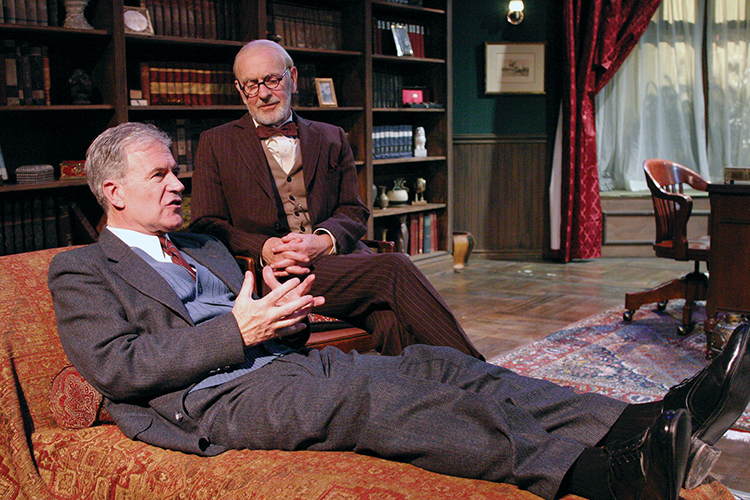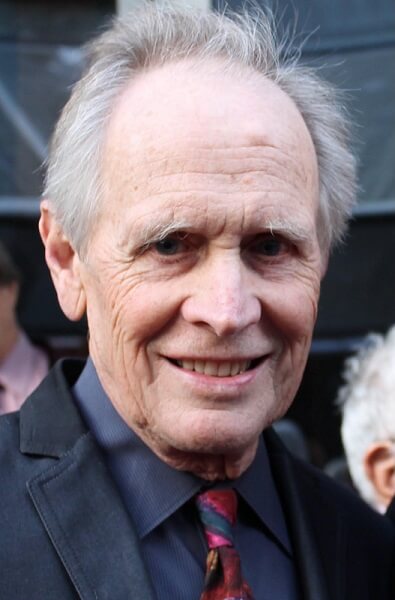By Libby Motika
Palisades News Contributor
One wonders if the avowed atheist Sigmund Freud, reckoning with the painful fatal stages of oral cancer, invited C.S. Lewis (Chronicles of Narnia) to his home hoping that perhaps the Christian apologist might offer him some relief from his deeply entrenched cynicism.
As imagined through the brilliant script of playwright Mark St. Germain, the action in “Freud’s Last Session” unfolds in the renowned psychiatrist’s newly established home in London, where he and his family have found safety from the German occupation of Austria.
The confines of Freud’s office frame an inescapable focus. It is September 3, 1939, with Europe threatened by Hitler’s despotism; King George VI declares war against Germany and bombers are already screeching across the sky.
Set designer Pete Hickok has created a marvelous cabinet of wonders in one room. Shelves are filled with books; photos offer a hint of family. The therapist’s cot anchors one corner; a crescent of sacred figures—Buddha, Zeus, Athena—encircles the desk blotter as if to give Freud a composite of godly wisdom.

Photo: Enci Box
Audiences who might anticipate a dialectic of importance, but perhaps a bit ponderous, instead find an 80-minute discourse that is cogent, witty and deeply embodied by these two men.
Freud is a doctor, a man of science with strong convictions, grounded in the here and now.
Forty years his junior and taking an entirely different path, C. S. Lewis is steadfast in his Christian faith, which he returned to after having abandoned Christianity at age 15, and which formed the basis of many of his writings.
Freud, played by Palisadian Martin Rayner, comes by his pessimism with evidence.
“I do not count on my tomorrows,” he says. “I saw only Nazis burning my books while I looked out of my window in Vienna.”
Lewis (Martyn Stanbridge) places his faith in a moral conscience, something, he says, we’re all born with. He insists that our deepest cravings (joy) equate to an inherent desire for a creator.
So it goes, Freud lobbing witty retorts to Lewis’ earnest faith, until the roles shift. An unexpected bombing alert unhinges both men, stripping them of their arguments. Now these are two men, mere men, terrified and humbled.
Freud, visibly weakened, confesses that he will kill himself before the cancer does. “I found the truth; the end is the end,” he tells Lewis.
“It’s madness to try and solve the greatest mystery of all time in one morning,” Freud concludes.
“The greater madness is not to think of it all,” Lewis says.
Rayner, who created the role eight years ago for the world premiere at the Barrington Stage Company in the Berkshires and off-Broadway at the New World Stage, reflects on reprising the role.
“The distance has given me a little bit of time to change, to drop baggage. I think now I can be subtler,” he told the News.
“Martyn is a Brit, which gives us an ability to communicate with tiny brushstrokes. The tone of voice people use in England to convey irony, fake sarcasm or real sarcasm in intonation can convey a lot.”
Rayner, who lives on Porto Marino Way in Castellammare, is pleased that the play has been revived at this time. “I really appreciate the idea of great minds fencing with each other; there is an underlying knowledge and authenticity. We need that desparately now, a certain kind of truth.”
“Freud’s Last Session” continues through March 4 at the Odyssey Theatre, 2055 Sepulveda Blvd. For more information, contact 310-477-2055 or visit http://www.odysseytheatre.com.


























You must be logged in to post a comment.